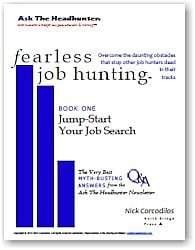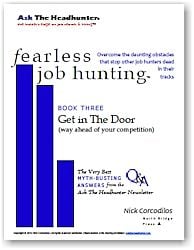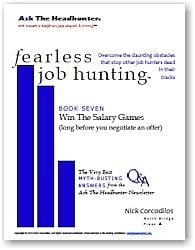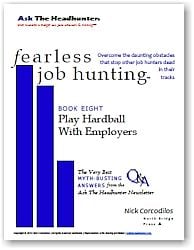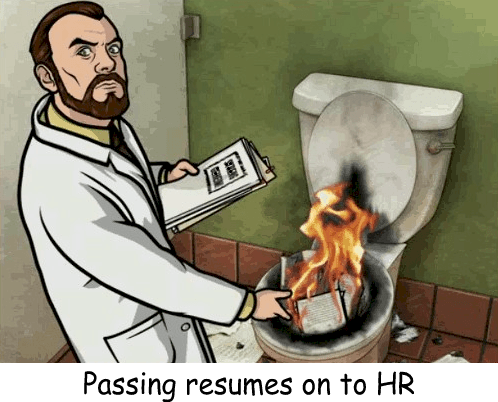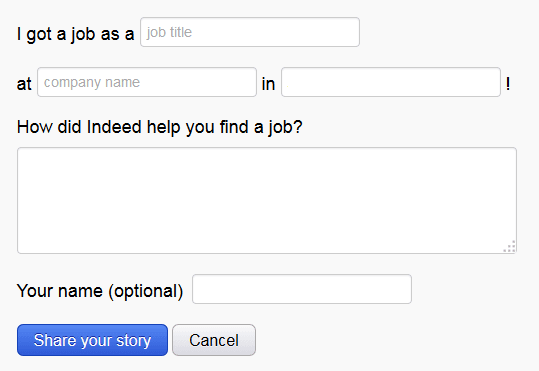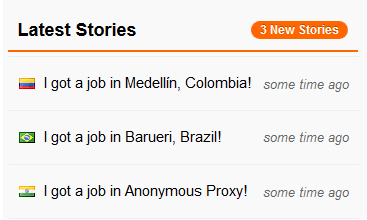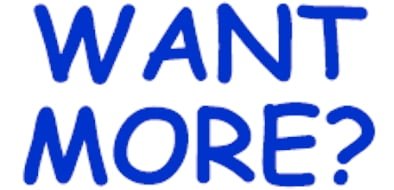In the December 23, 2014 Ask The Headhunter Newsletter, several job seekers bemoan the state of employment:
Question
This week’s edition addresses submissions from several readers:
- “I don’t understand it. I must have responded to over 50 job postings in the last month, and I haven’t gotten a single interview.”
“I’ve completed over a dozen job applications, and I haven’t heard from one company.”
- “The tight market puts employers and recruiters in the driver’s seat once again. Fewer jobs are available, and there’s a larger talent pool to choose from.”
- “Companies that once had to make offers on the spot to snare candidates now have the luxury of time. They can postpone making hiring decisions until they find someone who meets all their criteria.”
The question behind all these plaintive protests is clear: Why am I not getting hired?
Nick’s Reply
Whoo-whee! It’s that time of the year — the best time of year to get a job. Companies are indeed hiring. They’re just not doing it the way you’d expect. They’re in a hurry but they don’t want to make mistakes. All across this blog, we discuss how to help employers make the decision to hire you. These concepts are laid out in how-to fashion in the Ask The Headhunter PDF books, and we’ll summarize some of them here.
If you’d like to buy one or more Ask The Headhunter books, I’ll offer you a holiday discount! Take a jolly 25% off your purchase by using discount code=JOLLY.
[Discount code JOLLY extended through New Year’s weekend!]
Consider the logic of the frustrated job hunters above. It’s not logic at all. It’s pure frustration that stems from not being the right candidate. Who’s fault is that? Difficult as it might be to hear this, please listen:
- Don’t approach a company if you’re not the right candidate.
- Don’t make rationalizations when a company ignores you.
It’s true that many companies are hiring fewer people because things are tight, but that doesn’t mean they have the luxury of time. In fact, the opposite is often true. Some managers are under great pressure to fill precious slots before the year ends and budgets close (or are cut). Thus, employers are not hiring slowly because they can, but because they can’t get the right candidates. They are deluged with every Tom, Dick, and Jane who has a minute to submit an application — and those same managers are burdened with applicant tracking systems that can’t distinguish strong candidates from weak ones.
Remember that most hires are made via trusted referrals and personal contacts. Why? Because this is the most reliable source of good, appropriate candidates. When managers can’t get a hire through this preferred channel, they turn to lesser sources, like ads and resume submissions. They know the odds of finding a good candidate are low, but they, too, are frustrated and desperate. They need to fill a job now. Put that in your Santa’s pipe and smoke it — and you’ll sweep past your competition.
 ‘Tis the season to be truly right. If you are the candidate a manager needs, you can capitalize on the rush to hire. You can give a manager the gift he’s been waiting for: your earthly presence. Help him to spend his budget and make the hire. Be ready to articulate your value, but do it face-to-face or on the phone.
‘Tis the season to be truly right. If you are the candidate a manager needs, you can capitalize on the rush to hire. You can give a manager the gift he’s been waiting for: your earthly presence. Help him to spend his budget and make the hire. Be ready to articulate your value, but do it face-to-face or on the phone.
Make it personal. Like Baba Ram Das said in 1976, “Be here now.” A resume doesn’t cut it. An application doesn’t cut it. When you hide behind a form, you’re admitting that you’re not sure you’re the right candidate. You are afraid to face the manager because you have nothing compelling to say. If you’re the right candidate, then you have exactly what it takes to make a manager smile and say, “Yes!”
There aren’t 400 jobs out there for you. You can be the truly right candidate for only one, or two, or maybe three different jobs. Pick them carefully. Study, prepare, create a business plan to prove your value to the specific manager, and go after those two or three jobs and no others.
Here’s the secret to showing an employer why she should hire you: Estimate as best you can how your work produces revenue or reduces costs for the company.
Excerpted from Fearless Job Hunting, Book 6, The Interview: Be The Profitable Hire, p. 8:
Identify your role in the profit equation
If you work in sales or product design, you help produce revenue by selling or by creating products. That’s good for the company. The more you contribute to revenues, the more value you add to the business.If you work in information technology or in manufacturing, you have a daily impact on the company’s costs. (But, of course, every worker is part of a company’s costs.) High costs are not good. Your job contributes to the success of the business by helping minimize costs (also known as increasing efficiency) while performing a function necessary to help produce revenue.
The difference between revenue and cost is profit. So, regardless of what your job is, ask yourself what you do to enhance profits. Do you sell more stuff at higher margins, or do you do some other job smarter, faster, and cheaper? Explaining this to an employer helps you demonstrate your value.
The frustrated candidates who submitted the complaints above are not being dismissed because their resumes are lousy, but because they are cows. If you merely send in a resume, what’s the chance you are really the right candidate? If you rely on nothing but a dopey job posting, how can you know what a job is about or what a manager wants? Please: Be realistic. Take the most reliable, proven path to a job. If you are really the right candidate, prove it by getting referred by someone the hiring manager trusts.
 I know I sound a bit harsh. My suggestions seem like an unreasonable burden on a job hunter. The notion that it’s up to you to pick the right job creates a daunting task. And making personal contact with hard-to-reach managers is so difficult. This is all very hard work.
I know I sound a bit harsh. My suggestions seem like an unreasonable burden on a job hunter. The notion that it’s up to you to pick the right job creates a daunting task. And making personal contact with hard-to-reach managers is so difficult. This is all very hard work.
Yep. But so is the great job you want. The task of finding and winning it has never been easy. If you believe otherwise, you’re grasping at straws. You already know this isn’t simple. You already know that being dead-on for a job is a rare experience. But if you don’t make it happen, it’s not likely to happen on its own.
Take advantage of this high-pressure time when managers really do want to fill jobs. But don’t be casual about it. Get personal. Be the right candidate who picks the one right company, the one right job, then picks up the phone and delivers the solution a manager has on his wish list.
(For more on job hunting during the holidays, please read The Third Fallacy.)
The candidate who does all that is who you’re competing with, whether she learned this approach from me or whether it’s just her common sense. Long-time ATH subscriber Ray Stoddard puts it like this:
“The great news about your recommendations is that they work. The good news for those of us who use them is that few people are really willing to implement what you recommend, giving those of us who do an edge.”
These are some key tips to help you get the edge you need over your competitors:
I hope Ask The Headhunter helped you get an edge in 2014. We will continue to discuss the details of the methods outlined here in upcoming issues of this newsletter. Meanwhile, here’s wishing everyone a very Merry Christmas, Happy Holidays (no matter what you celebrate or where you celebrate it), and a Happy, Healthy, and Prosperous New Year! See you with the next edition on January 6!
Save a JOLLY 25%!
If you purchase one or more Ask The Headhunter PDF books in the Ask The Headhunter Bookstore, please take advantage of this jolly holiday 25% OFF discount.
When you order, use discount code=JOLLY and I’ll deduct 25% from your purchase price — no matter how many PDF books you buy! (This is a limited-time offer for the holidays! Expires Jan. 1, 2015!) [Discount code JOLLY extended through New Year’s weekend!]
How have you used the ATH methods to land the job you want, or to hire exceptional employees? What methods of your own have you used successfully? Please share, and let’s discuss — what matters most is what works best out in the field!
: :









